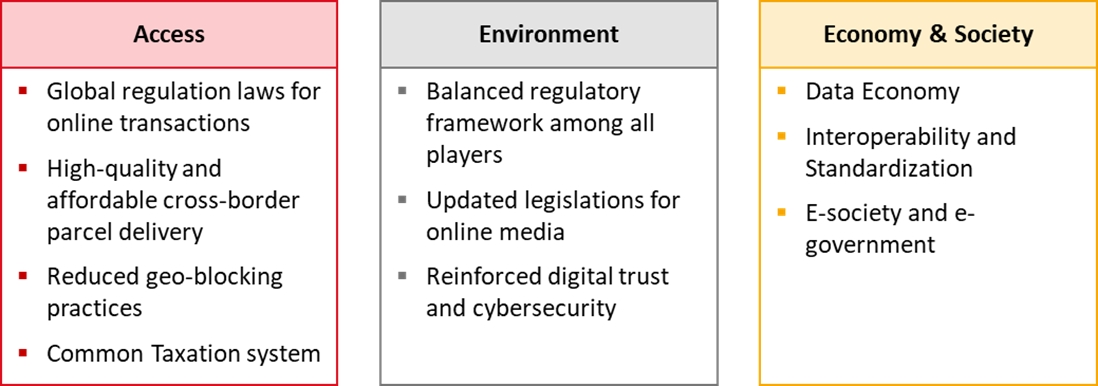Industry Thought Leadership
Building Key Pillars of Digital Agenda in a Level-playing Field
August, 2019The fourth industrial revolution is rapidly transforming all sectors and markets. Digital transformation is no longer an option or enhancement to existing businesses; it is a core feature, an unavoidable evolution for any process and solution in every organization. The Information and Communication Technology (ICT) is no longer a vertical sector within the global economy, it has become a horizontal layer, deeply integrated in the foundation of every other sector. This digital revolution is not only transforming the corporate world, it has also shaped our lives as individuals and our communities. This innovative transformation is evolving at a scale and speed that bring immense opportunities for innovation, growth and prosperity. In order to make a better use of these unlimited opportunities offered by the digital technologies, 5G and IoT, all key stakeholders should push towards a common digital agenda in a level-playing field.
A level-playing field is a fair market situation in which all players have the same chance of succeeding. It is a market that ensures the free movement of goods, services, and capital. A status quo where individuals and businesses can seamlessly access and exercise online and digital activities all under the same laws, regulations, regardless of the user, network or servers’ location.
The digital agenda in a level-playing field relies on three key pillars:
- Better Access for individuals and organizations to digital products and services.
- A fair and commonly regulated Environment in which digital and innovative services can flourish
- A maximized growth potential for the digital Economy and connected Society.

1. Access
The level-playing field can provide suppliers and consumers with an open and free market in which any consumer may have access to any digital product and service. Entry barriers for young entrepreneurs will be reduced, creating job opportunities and innovative digital services.
A fair marketplace, where all players have the same success chances and operate under the same cross-border regulations, have less entry-barriers. Entrepreneurs, especially young ones, have more chances to participate in the digital realm and introduce their digital innovations to consumers. Successful ideas can easily scale up once they are able to manage their businesses under a common set of rules. Thus, it is essential to break down barriers between countries by reducing the differences in contracts, e-commerce, digital copyrights and consumer protection laws.
Cross-border parcel delivery is another hurdle in e-commerce. Stakeholders suffer from lack of transparency, excessive costs in particular for small shipments, complicated customs’ rules and fees. In a level-playing field of digital services, e-commerce providers should have access to affordable, high-quality and cross-border parcel delivery, that can encourage consumer trust in cross-border online sales.
Large players, mainly in oligopoly markets, tend to restrict access to consumers based on their location; they sometimes force a redirection to local or regional websites, completely ban access to some content or also show different prices and currencies for different users. Such practices are sometimes referred to as forced segmentation of customer base, or geo-blocking. Authorities and regulators should protect the right of consumers to access any digital content and the right of sellers to offer their products to any user. A cross-border digital law or agreement should ban any unjustified geo-blocking practice.
Taxes imposed on products sold across countries represent a tricky challenge for all cross-border sellers, in particular online stores. In fact, having to deal with many different national taxation policies and systems increases administrative efforts and costs for merchants. In a level-playing field, a new innovative taxation system should govern transactions between suppliers, vendors and consumers.
2. Environment
A level-playing field should rely on a high-speed, affordable and reliable infrastructure, from one side allowing innovative services to flourish, and on another side safeguarding consumers’ rights to privacy and personal data protection. ICT networks are well positioned to provide the backbone for such an infrastructure. However, competition and user demands are still pushing towards lower prices and better quality of services. The ICT sector and telecommunications in particular, are undergoing structural changes to cope with the new trends and market requirements.
A consistent market approach to spectrum policy and management, a balanced regulatory framework for all ICT and OTT players, incentives for investments in high-quality broadband networks and an effective regulatory institutional framework are the main characteristics of a productive ICT environment.
Rapid technological changes and the development of new business models are having a very high impact on the media landscape. The ways users are accessing, streaming and buying audiovisuals are completely shifting. An imperative update of the audiovisual and media services legislations and rules is required, with special focus on the protection of minors, advertising rules, privacy and copyrights protection.
As security, privacy and copyrights are becoming the real hurdles in this digital word, joint efforts from all key stakeholders shall combat illegal content, increase visibility over collected personal identifying data, fight redistribution of copyrighted content and increase transparency for paid advertisement versus natural content, especially on social media platforms. These measures can reinforce the trust and security in digital services and in handling of personal data, which constitute a major milestone in achieving a successful digital realm.
3. Economy and Society
In the coming few years, most economic activities will depend on digital ecosystems. Digitization of processes, interfaces and business models would offer unprecedented opportunities to all sectors. Digital economies and societies will experience intelligent transport systems, smart grids and metering, automation of everything, sustainable use of natural resources, healthier environments, smart cities, developed healthcare, mobile education… thus improved well-being of citizens.
Embracing the digital transformation of economies and societies require building a data-driven economy, encouraging interoperability and standardization and introduce an e-government to oversee this whole ecosystem.
Data is a key catalyst for economic growth, innovation and digitization across all markets. ICT contribution is vital to store, explore, analyze, monetize and make the best out of data. Innovative solutions and technologies such as cloud computing, virtualization, big data, analytics and artificial intelligence are major contributors to building a data economy.
In the digital economy, interoperability ensures effective communication between digital platforms, interfaces, devices, networks and data repositories. It reduces obstacles between digital components, resulting in a more efficient connection across solutions and borders. Standardization has an essential role to play in increasing interoperability of new technologies within a level-playing field.
Public administrations, governments and institutions are striving to achieve higher citizens’ experience, reduce costs, and increase transparency while maintaining a higher level of security and economic stability. Converging towards an e-government, would make it easier later on to connect official authorities across the globe, interconnect business registers, unify taxation systems, connect digital gateways and process e-contracts and e-signatures. Which shall create a user-friendly global e-government platform for citizens and businesses across the globe.

